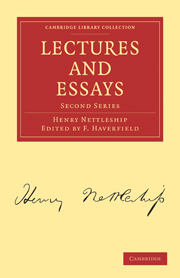Book contents
- Frontmatter
- PREFACE
- Contents
- Dedication
- MEMOIR BY MRS. NETTLESHIP
- I JOHAN NICOLAI MADVIG
- II THE ORIGINAL FORM OF THE ROMAN SATURA
- III LITERARY CRITICISM IN LATIN ANTIQUITY
- IV THE HISTORICAL DEVELOPMENT OF CLASSICAL LATIN PROSE
- V LIFE AND POEMS OF JUVENAL
- VI THE STUDY OF LATIN GRAMMAR AMONG THE ROMANS IN THE FIRST CENTURY A. D.
- VII ON THE PRESENT RELATIONS BETWEEN CLASSICAL RESEARCH AND CLASSICAL EDUCATION IN ENGLAND
- VIII THE MORAL INFLUENCE OF LITERATURE
- IX CLASSICAL EDUCATION IN THE PAST AND AT PRESENT
- X AUTHORITY IN THE SPHERE OF CONDUCT AND INTELLECT
- XI THE RELATIONS BETWEEN NATURAL SCIENCE AND LITERATURE
- BIBLIOGRAPHY
- INDEX
IX - CLASSICAL EDUCATION IN THE PAST AND AT PRESENT
Published online by Cambridge University Press: 05 October 2010
- Frontmatter
- PREFACE
- Contents
- Dedication
- MEMOIR BY MRS. NETTLESHIP
- I JOHAN NICOLAI MADVIG
- II THE ORIGINAL FORM OF THE ROMAN SATURA
- III LITERARY CRITICISM IN LATIN ANTIQUITY
- IV THE HISTORICAL DEVELOPMENT OF CLASSICAL LATIN PROSE
- V LIFE AND POEMS OF JUVENAL
- VI THE STUDY OF LATIN GRAMMAR AMONG THE ROMANS IN THE FIRST CENTURY A. D.
- VII ON THE PRESENT RELATIONS BETWEEN CLASSICAL RESEARCH AND CLASSICAL EDUCATION IN ENGLAND
- VIII THE MORAL INFLUENCE OF LITERATURE
- IX CLASSICAL EDUCATION IN THE PAST AND AT PRESENT
- X AUTHORITY IN THE SPHERE OF CONDUCT AND INTELLECT
- XI THE RELATIONS BETWEEN NATURAL SCIENCE AND LITERATURE
- BIBLIOGRAPHY
- INDEX
Summary
I shall endeavour, in the few remarks which I am going to make on this subject, to give some idea of the origin of classical education, and the different character and position which it has necessarily assumed, under the pressure of varying circumstances, at different periods of history. This may perhaps make it easier to realize on what ground it stands at present, and what services it can still render in modern civilized communities.
The principle underlying the system of classical education was originally this: that it was a good thing for a boy to know the best literature, because the best literature would furnish him not only with models of artistic composition, but with words of practical wisdom which might aid him in the realization of moral truth.
All educational material must be, from the nature of the case, a small selection from the great mass of knowledge; but the smaller this mass of knowledge is at any period, the larger, of course, will be the proportion which the material of education bears towards it. At the present time our great difficulty lies in the vastness of the field around us. The amount which can be known is infinite, but the limitations of each individual mind remain, and are likely to remain, what they always have been.
If we wish to find a people, and a period of history, which in this respect presented conditions almost diametrically opposed to those of our own day, we cannot do better than look at the Athenians in the early and middle parts of the fifth century b.c.
- Type
- Chapter
- Information
- Lectures and EssaysSecond Series, pp. 208 - 217Publisher: Cambridge University PressPrint publication year: 2010First published in: 1895

